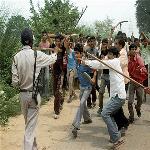23 August 2010

Photo: AP
Indian villagers attack a policeman during a protest by farmers demanding better compensation for their land acquired by the state government for an upcoming expressway project near Agra, 17 Aug 2010
In India, protests by farmers about land acquisition in the country's most populated state have focused attention on the growing conflict about land, as the economy modernizes. The growing resistance by rural communities about giving up their land for industrial expansion is throwing up new challenges for India.
The violent protests in the northern state, Uttar Pradesh, earlier this month were sparked by demands by farmers for higher compensation for land taken from them to build a highway connecting New Delhi with the tourist hub, Agra, home to the Taj Mahal. Three farmers were killed in the demonstration.
The clashes are the latest in a series of protests which have erupted in many parts of the country about efforts to acquire farmland for infrastructure projects or industry.
As India industrializes, businesses are in search of more land to build factories. The government is under pressure to quickly improve rickety infrastructure and build more highways, power stations and railways to meet the needs of an expanding economy.
The only free land available is populated, fertile farm land across rural India. Moving farmers and tribal communities off the land is not always proving to be easy.
Farmers complain
Some farmers complain that compensation given for their land is too low. And, they worry about loss of their livelihood in a country where two thirds of the billion-plus people live off the land.
Devinder Sharma of the Forum for Biotechnology and Food Security in New Delhi says promises of employment in the new industries do not materialize for the bulk of the farmers whose land is taken away. He says many of them are driven to an uncertain future in cities.
He says the new economy cannot sustain the kind of employment which farming provides in a populous country.
"No industry or group of industries can provide the kind of jobs or the scale of jobs India needs," Sharma said. "In a country which has 600 million farmers including their families, I don't think any industry has the capability or even industrial sector has the capability to provide even jobs to even one-tenth of that population."
However, businesses argue that an expanding industry can provide millions of new jobs and transform India to an industrialized nation.
Hurdles
The hurdles in acquiring land are slowing down investment and industrial expansion. Mining and steel projects proposed by big companies, such as ArcelorMital, Posco, and Vedanta Resources, are in hiatus as efforts are made to resolve conflicts with local populations. Plans for new power plants, roads and special economic zones to promote trade are facing similar hurdles.
An economist at the Federation of Indian Chambers of Commerce and Industry, Anjan Roy, says the issue is complex and needs answers which can address the interests of both sides. He says one of the suggestions is to make the displaced rural communities stakeholders in the new industries.
"Possibly giving them some stake, for example while putting up land for a new mine, giving them a stake in the mine, or some kind of shareholding in the industrial units which are coming up, that kind of gives a solution. One has to try out many solutions, a combination of them," said Roy.
It is widely believed that Maoist rebels – regarded as India's biggest internal security threat – are gaining influence as they tap the growing resentment in the countryside about land acquisition issues.
Reports that local officials often collude with business interests to take away land from villagers against their will has deepened such resentment.
Many food analysts also worry that handing over large chunks of farmland to industry could spark a food security crisis in a country which has a large population to feed and where spiraling food prices already pose a worry for millions of poor people.????
Government stand
Indian Finance Minister Pranab Mukherjee told parliament recently that a balance will have to be struck between the demands of industry and those of rural India.
"We shall have to ensure that the farmers are not disturbed, their interests are not jeopardized, because they have to play the most positive role in respect of ensuring food security," Mukherjee said.
Indian authorities admit that there is need for new legislation to protect the interests of farmers. But two bills which have been drafted are pending before parliament. These proposed laws are meant to ensure that farmers get compensation for their land at the market price. They also address issues of rehabilitation, jobs and training for those affected.
Development analysts say that the government has little time to lose in addressing these complex issues to ensure that the transition from a country of small farmers to a modern economy is a smooth one.